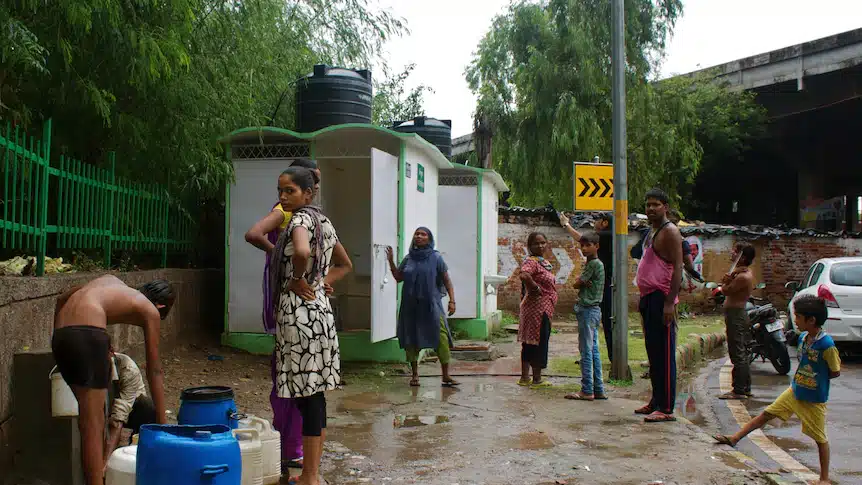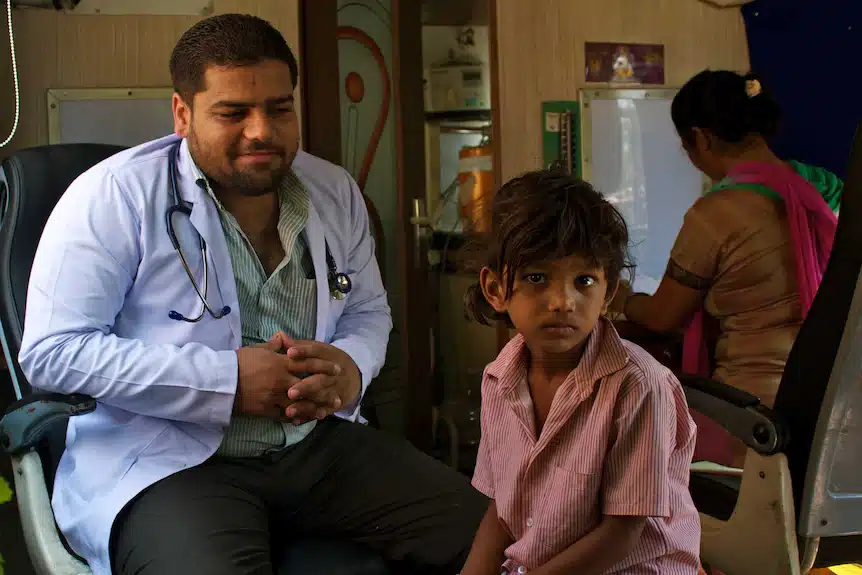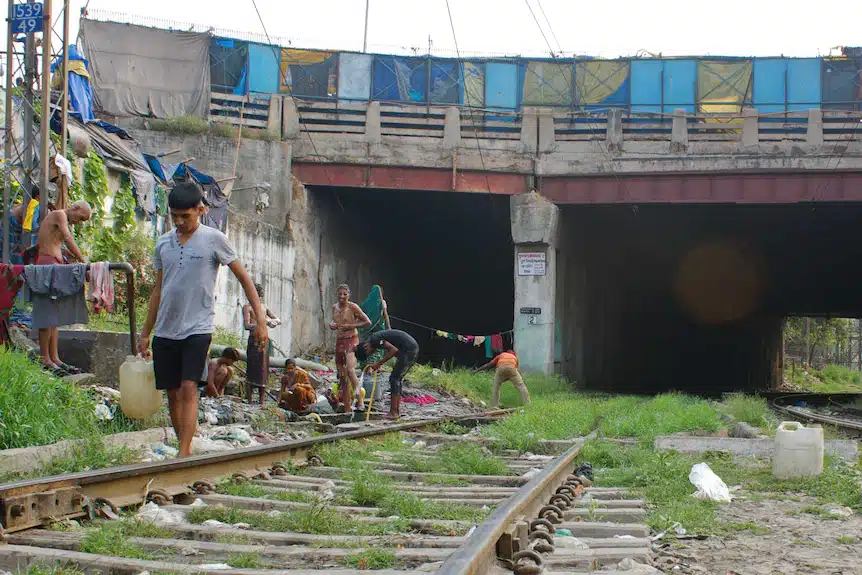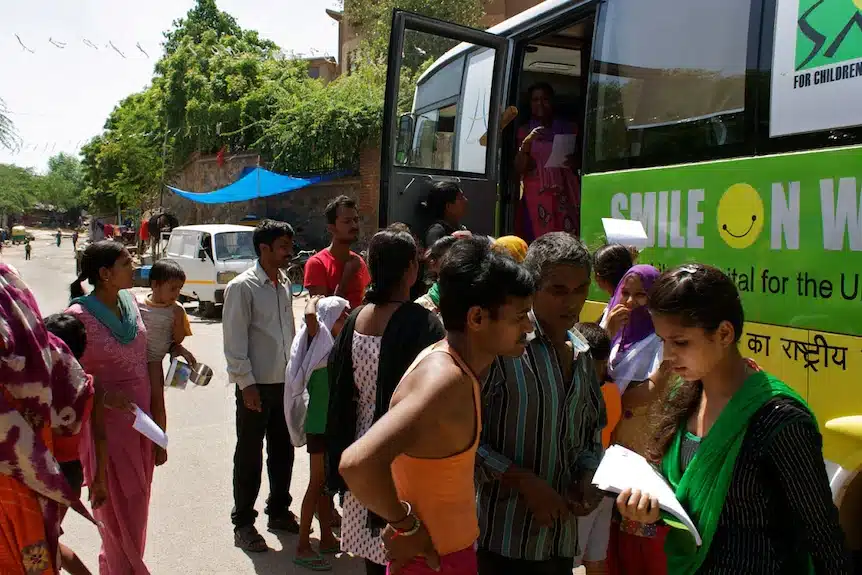(18 Sep 2015)


India’s prime minister went into his election campaign vowing to eradicate defecation in public by 2019. But as Alys Francis reports from New Delhi, providing the facilities has yet to change the culture.
Tania Kumari did not eat last night after spending the day throwing up.
She keeps her skinny arms clamped in her lap as she is examined in a mobile health clinic next to Sanjay slum, wedged between the Nigerian and Singaporean embassies in India’s capital.
“This is a typical case,” Dr Rupesh Dalavi of the NGO Smile Foundation said, gesturing towards the six-year-old.
[Facilities are] inadequate, so people go in the open, they go to the railway tracks.
Infections causing vomiting are common and they are linked to bad sanitation.
In under a decade, the Sanjay slum’s population has doubled to 6000.
The brick huts rapidly multiply, but there is no space for toilets, and the community block does not meet the demand.
“What’s here is inadequate, so people go in the open, they go to the railway tracks,” community leader Sanjay Singh said.
It is a common problem in India, where more than half the population of 1.3 billion defecate outdoors.
It is the main reason India has the world’s highest number of diarrhoeal deaths in children under five.
India’s prime minister Narendra Modi has recognised open defecation as a major roadblock to development and vowed to wipe it out by 2019 as a tribute to Mahatma Gandhi’s 150th birthday.


Dr Rupesh Dalavi examines Tania Kumari in a mobile health clinic next to Sanjay slum.(Alys Francis)
Mr Modi launched the $44 billion Swachh Bharat (Clean India) program last October, aiming to build more than 110 million toilets. Almost five million were installed last financial year.
But critics fear the mission is in danger of going the same way as past sanitation programs that largely failed.
India’s 2011 census revealed more mobile phones than toilets. And some of those that have been built were reportedly being used to store grain.
“They’re sort of plodding along in the same way, on the ground not much has changed,” said a development worker advising the Modi government. He requested anonymity.
Asked if India would be free from open defecation by 2019, he said: “I don’t think it’s going to happen.”


Residents from the Pullmithai slum in Old Delhi have their morning wash.(Alys Francis)
Calls for better education
NGOs say the program is too focused on constructing toilets, with a 12,000-rupee ($255) household subsidy, and undervalues sanitary education.
But in rural India many do not see the need for toilets.
People tell us they’re ready to spend that much on buying a buffalo or getting a new extension, but a toilet is relegated.
When the Research Institute for Compassionate Economics (RICE) surveyed villages in 2014 it found that of the 43 per cent of homes that had a toilet, 25 per cent of men and 17 per cent of women still defecated outside.
In many parts of India the practice is socially acceptable.
“People tell us they’re ready to spend that much on buying a buffalo or getting a new extension, but a toilet is relegated,” Aga Khan Foundation director of programs Tinni Sawhney said.
Mr Sawhney said it was critical to change behaviour and motivate people to want toilets.
Behavioural change has been in the government’s sanitation plans since 1999. But a UNICEF official said there was no follow-up, meaning many who receive toilets neither want them nor understand the health benefits.


Slum residents line up to see a doctor at the Smile Foundation’s mobile health clinic in New Delhi.(Alys Francis)
Critics also point out that Mr Modi’s government cut the budget for behavioural change from 15 to 8 per cent when it restructured the national program.
And less than six months after it launched the program last year, the funding was cut by more than a third.
In cities, open defecation is seen as a problem caused by a lack of infrastructure rather than behaviour.
Over the past three decades India’s population has grown by more than 512 million, triggering rapid unplanned urbanisation and slums.
To stop open defecation in the 675 official slums housing 1.5 million people in New Delhi, 20,000 community toilet blocks are to be installed in India’s largest city.
But finding the space is difficult as “many slums are too close to the roads or railway tracks”, said VK Jain, the Delhi Urban Shelter Improvement Board’s chief executive officer.
But Mr Jain said the hardest part of his job was ensuring community toilets remain usable, as people often don’t keep them clean.
“That kind of mindset is not there,” he said.
New Delhi now plans to get slum residents to manage toilets and monitor cleanliness.
But community-run toilets need a lot of support, according to Jyotsna Lall, senior program officer at the Aga Khan Trust for Culture.
It established a toilet facility in Nizammudin, South Delhi, six years ago where locals operated the toilets.
But NGOs remained deeply involved, providing advice and financing for maintenance.


India’s population has grown by more than 500 million in the last 30 years.(Alys Francis)
“We’re talking about the poorest people,” Mr Lall said. “Many can’t read or write, they need a lot of help.”
Recently there have been media reports of officials fudging figures to meet construction targets.
But Mr Modi’s spotlight on sanitation has won him praise and one district has shown that change is achievable.
Nadia in West Bengal effectively halted open defection by March this year after a bureaucrat heard neighbouring Bangladesh had better sanitation.
Motivated by the Bangladeshi example, Nadia effectively ended open defecation over a 15-month period.
In Sanjay slum, community leader Mr Singh is optimistic open defecation can be eradicated.
But he disputes the official line that it only happens in cities because of a lack of toilets.
“Going in the open is a habit for people here,” he said.
“Only if we promote the health benefits, can we change.”
Source: https://www.abc.net.au/news/2015-09-18/india-bid-to-eradicate-defecation-in-public/6785256